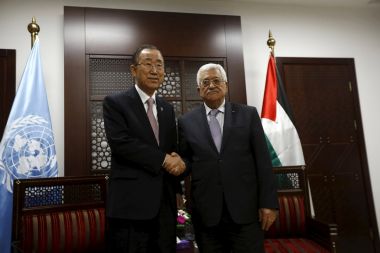UN Secretary General's visit fails to calm Israel-Palestine tensions

UN Secretary General Ban Ki-moon held talks with Palestinian President Mahmoud Abbas on Wednesday but after two days of discussions in the region appeared no nearer to ending weeks of Israeli-Palestinian violence.
At a news conference with Abbas in the West Bank city of Ramallah, Ban denounced "hateful discourse" on both sides and said Israel's response to Palestinian knife attacks had "added to the already difficult challenges of restoring calm".
Nine Israelis have been killed in Palestinian stabbings, shootings and vehicle attacks since the start of October, while 48 Palestinians, including 24 attackers, among them children, have been killed by Israeli security forces in response.
An Eritrean migrant mistaken for an attacker was shot and beaten to death on Sunday by an angry group of Israelis in the town of Beersheba. Police on Wednesday said they arrested four suspects from the incident.
Among the causes of the turmoil are Palestinians' anger at what they see as Jewish encroachment on the al-Aqsa mosque compound in Jerusalem's walled Old City, Islam's holiest site outside Saudi Arabia, which is also revered by Jews as the location of two ancient Jewish temples.
In his comments after meeting Israeli Prime Minister Benjamin Netanyahu on Tuesday, and again after meeting Abbas, Ban emphasised the need to reinforce the status quo at al-Aqsa, where non-Muslim prayer has been banned for centuries.
Israel says it has not and will not change the rules.
"I welcome Israel's repeated assurances that it has no intention of changing the historic status quo at the holy site," Ban said. "In my meetings yesterday with Israeli officials, I stressed that only through actions on the ground will perceptions begin to change."
Shootings
On Wednesday, Israeli forces shot dead a Palestinian who stabbed and wounded a soldier near the Jewish settlement of Adam in the occupied West Bank, police said.
In a separate incident in the West Bank, soldiers shot and wounded a Palestinian woman with a knife who approached the settlement of Yitzhar, the military said. Palestinian medics said she was 15 and her family questioned the military account.
The military also said that four Israelis were injured when a Palestinian driver rammed into them in the West Bank. Soldiers at the scene responded by shooting and wounding the driver.
"There is no focused, clear solution to this kind of challenge. There is an integrated, multi-dimensional response," Israeli armed forces chief Gadi Eizenkot said of the recent wave of attacks during a television interview. "I believe that a solution to this problem will be found, even if it takes time."
Netanyahu flew to Germany for talks with Chancellor Angela Merkel later on Wednesday and was scheduled to meet US Secretary of State John Kerry and European Union foreign policy chief Federica Mogherini in Berlin on Thursday.
Kerry is set to travel to the region later in the week where he will meet King Abdullah of Jordan, who has a role as a custodian of the Muslim holy sites in Jerusalem.
Abbas will also meet Kerry and Abdullah in Jordan. As well as the al-Aqsa compound, Abbas has emphasised Israel's occupation of the West Bank and settlement-building as reasons for the surge in Palestinian violence, particularly among teenagers living in Israeli-controlled East Jerusalem.
Netanyahu has repeatedly accused Abbas of inciting the violence. In comments at the news conference with Ban on Wednesday, Abbas returned to the need for international protection at al-Aqsa, known to Jews as Temple Mount.
"The continuation of the occupation and violations to Muslim and Christian sites in East Jerusalem may open the gates to a religious conflict," Abbas said. "We must maintain the historical condition and not the status quo imposed by Israel."
In Paris, the executive board of the United Nations cultural heritage body UNESCO adopted a resolution on Wednesday condemning Israel's handling of the al-Aqsa issue. But it dropped a potentially more controversial clause laying claim to Jerusalem's nearby Western Wall as a holy site for Muslims only, Israeli diplomats said.











